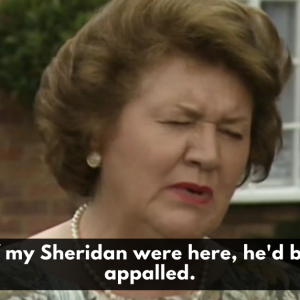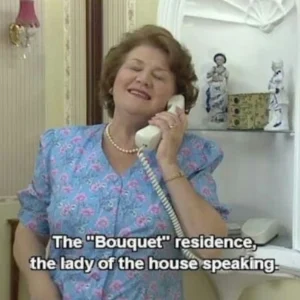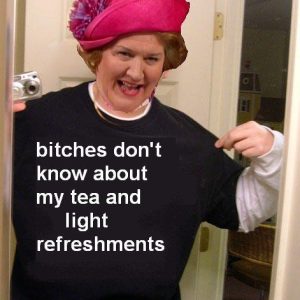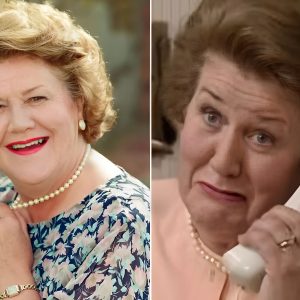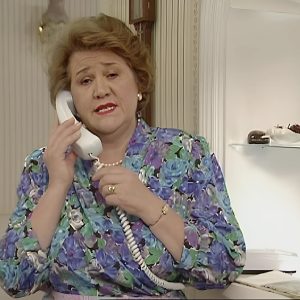Patricia Routledge Returns to the Stage: A Timeless Voice, a Wartime Pianist, and the Power of Language
In a world increasingly captivated by fast fame and streaming sensations, Dame Patricia Routledge stands as a monument to artistic endurance, eloquence, and the transformative power of performance. At 82, the Olivier Award-winning actress best known to millions as Hyacinth “It’s Bouquet!” Bucket from the beloved BBC sitcom Keeping Up Appearances, has returned to the stage. But what could possibly tempt one of Britain’s most cherished comedic icons out of semi-retirement?
The answer, it turns out, lies in two timeless forces: the King James Bible and the resonant memory of wartime pianist Dame Myra Hess.
We meet in the heart of Chichester, the quiet West Sussex cathedral city Routledge has called home for more than a decade. As rain taps softly on the café window, she leans forward with sudden intensity, her voice dropping to a conspiratorial hush. “History!” she exclaims. “And character. Architecture! Here, you dig a hole for a bulb and you might find a Roman mosaic. Thrilling.” It’s a statement infused with the same theatrical flourish and quicksilver wit that have defined her storied career.
For someone whose name has become synonymous with one of British comedy’s most iconic characters, Routledge has never been seduced by the limelight. “I was never stage-struck,” she says, with matter-of-fact clarity. “I’m not stage-struck now. Nobody’s more surprised than I am that I have, in fact, spent my life doing this.”
Yet do it she has—and with unshakable command. Routledge’s six-decade career has spanned everything from Shakespeare to musical theatre, with a detour into household fame courtesy of a bossy, bouquet-pronouncing social climber who terrorized her neighbors in floral-print dresses and clipped vowels. Despite the long shadow cast by Hyacinth Bucket, Routledge’s theatrical legacy is far more profound.
Now, she is channeling that formidable voice into sacred texts, performing live readings from the King James Bible at London’s National Theatre in honor of the edition’s 400th anniversary. “It’s David and Saul and Jonathan,” she says gleefully. “The Queen of Sheba. Bathsheba. Terrible people—it’s worse than EastEnders! Incest, murder, betrayal—if you don’t like someone, you just get them popped off.”
It’s been nearly two decades since Routledge last graced the National stage, when she performed in Nicholas Hytner’s acclaimed 1992 revival of Carousel. That role, like many in her theatre career, drew on her versatility as both actress and singer—a skill often overshadowed by her television fame. In 1988, she won the Olivier Award for Best Actress in a Musical for her performance in Leonard Bernstein’s Candide, proving herself a master of musical timing and emotional range.
So, how does it feel to be back? “Wonderful,” she says with visible satisfaction. “There was a lot of talk of doing a new play ‘with me and for me.’ But life happened. I went and did other things—television, of course. The dreaded monster.”
These days, Routledge chooses her roles with care. She isn’t drawn by glamour or accolades but by material that stirs her soul. “If you can’t wake up in the morning excited about what you’re going to do in the evening—and twice on Wednesdays and Saturdays—it’s not worth doing.”
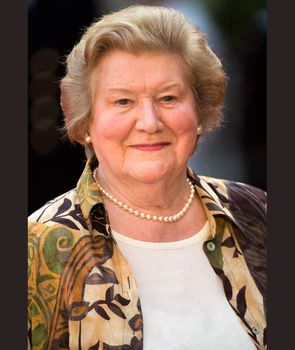
One such project is Admission: One Shilling, a touring tribute to Myra Hess, the renowned pianist who held more than 1,700 lunchtime concerts at London’s National Gallery during the Blitz. Routledge vividly recalls seeing one of those wartime performances as a schoolgirl growing up in Birkenhead. In the show, she reads excerpts from Hess’s interviews, while pianist Piers Lane recreates her legendary playing. “Her style was restrained, deeply committed to the music,” says Routledge. “No thrashing about the keyboard like you see today. Why do performers feel the need to show us what it costs them? Let the music—or the acting—do the work.”
This reverence for craft over showmanship runs through all of Routledge’s work. From her early days in repertory at the Liverpool Playhouse to collaborations with playwright Alan Bennett—who wrote roles specifically for her, including the fussy, repressed Peggy Schofield in A Woman of No Importance—she has championed “this great, rich language” of the stage. She bristles at the way contemporary actors often abuse it. “There’s a fashion for speaking as badly as possible. I’m of a mind,” she says with a glint of mischief, “to start a society for the reinstatement of the letter T, and the banishment of the glottal stop.”
And while she may joke, her frustration with modern broadcasting runs deeper. In 2008, she famously criticized the BBC for abruptly canceling her popular detective drama Hetty Wainthropp Investigates. The show had already been commissioned for a fifth season when, as Routledge recounts, “some 10-year-old invited the producer into his office and said, ‘Oh, we won’t be doing any more.’ The BBC never had the courtesy to tell us directly.” Asked whether she now sees the decision as ageist, she hesitates. “At the time, no. But in retrospect… yes. I think so.”
Despite these disappointments, her connection with audiences remains undiminished. Fan mail still pours in from around the world, and she makes a point of answering as many letters as she can. The ones she treasures most? “The ones from nine-year-old boys,” she laughs. “They write, ‘My dad’s been laughing at a woman like you across the road.’ That’s gold. Because, of course, there are people like Mrs. B everywhere.”
Does she resent the enduring shadow of Hyacinth Bucket? Not at all. “If everything focuses on that, it’s too silly. But it would be churlish not to appreciate what it brought me. If people come into the theatre because they remember Mrs. B, I couldn’t be happier.”
For Patricia Routledge, the stage was never a dream, but a destiny quietly fulfilled—driven not by ego, but by a deep and enduring love for language, character, and the electric communion between performer and audience. Now, with Bible verses ringing from the rafters and Myra Hess’s music echoing through concert halls, she proves that even in the twilight of a long and luminous career, greatness never dims. It deepens.
—
Laura Barnett is a writer and journalist covering the arts and performance. This article first appeared in the entertainment section of The Guardian.
